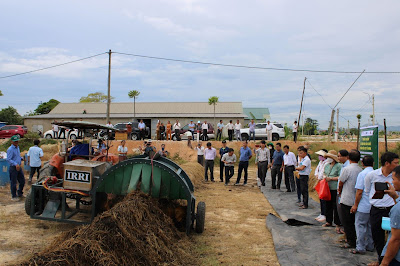(29 August, THUA THIEN HUE, VIETNAM) To promote a circular economy in agriculture through the recycling of rice straw as a renewable resource, the International Rice Research Institute (IRRI), in collaboration with the University of Agriculture and Forestry, Hue University (HUAF), conducted a workshop and field demonstration on mechanized rice straw composting on 29 August 2023 at the An Lo Agricultural Cooperative in Phong Dien District, Thua Thien Hue Province, Vietnam.
Approximately 24 million tons of rice straw are produced annually in the Mekong Delta where most of Vietnam’s rice crops are grown and are traditionally burned on the field posing health hazards to people and the environment. Introducing a circular economy model to the country’s rice sector promotes the recovery of materials considered waste by-products and converting them into renewable resources.
Rice straw is important in the circular economy and the need for mechanization to improve the rice straw composting process. HUAF Principal Tran Thanh Duc emphasized.
The workshop featured a field demonstration on mechanized rice straw composting and the proper operation of the compost turner machine, which helps reduce composting time and increase the uniformity of materials. The compost turner also incorporates spraying water-dissolved microorganisms or enzymes during the turning process.
An Lo Agricultural Cooperative started manufacturing and selling the compost for farmers to compare its effectiveness with inorganic fertilizer. The working capacity of the compost turner allows for the production of 20-30 tonnes of compost per hour. The composting process takes place about 45 days, reducing 50% of rice straw composting time in comparison with traditional practices such as manual composting or using bulldozers.
Nguyen Van Hung, a scientist at IRRI Vietnam, presented the rice straw-based circular economy (RiceEco) and some of the challenges faced by central provinces in agricultural production and the need for profitable utilization of waste products.
Dr. Hung discussed the process of producing rice straw compost from wet straw through mechanization and biotechnology and its positive impact on nutrient efficiency. He cited Sustainable Rice Straw Management, an open-access book published by the Department of Crop Production and IRRI, that provides a wide array of options for rice straw management that are potentially more sustainable, environmental, and profitable compared to current practice.
“The mechanization of straw organic fertilizer production is a step towards organic, circular, and sustainable agriculture in Hue,” said Ho Dinh, head of Hue Crop Production and Plant Protection Sub-Department.
A discussion provided the opportunity to address participants' concerns on rice straw collection and handling as well as their insights and practical guidance on mechanized rice straw composting to enhance agricultural practices in Thua Thien Hue Province and the South Central Coast region.
This work is part of the GIZ-funded Promoting rice straw innovations project, the Mekong-Republic of Korea Cooperation Fund-supported Rice straw-based Circular Economy (RiceEco) project, and the CGIAR Initiative on Asian Mega-Deltas.
###
Learn more about IRRI (www.irri.org) or follow us on social media and networks (all links down the right column).





No comments:
Post a Comment